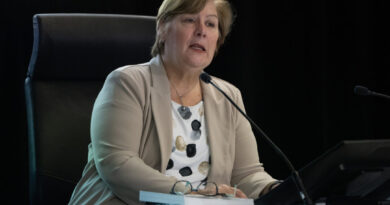Alberta Seeks Intervenor Status in Legal Battle Over Saskatchewan School Pronoun Policy
The province of Alberta has expressed its intention to intervene in Saskatchewan’s appeal of its new law requiring parental consent for children to change their pronouns at schools.
Intervenor status allows parties not directly involved in a case but impacted by the outcome to participate in legal proceedings.
Saskatchewan’s policy initially required parental consent for students under 16 to change their names or pronouns. Premier Scott Moe announced the policy in August, but it has since been replaced with the Parents’ Bill of Rights following rescission.
Mr. Moe utilized the notwithstanding clause to safeguard the legislation from legal challenges.
The joint statement from Alberta Attorney General Mickey Amery and Saskatchewan Attorney General Bronwyn Eyre affirms Alberta’s support for Saskatchewan’s use of Section 33 of the Charter (Parliamentary Supremacy Clause). The ministers emphasize the importance of parents in children’s lives.
Both provinces are dedicated to supporting families and children to address unique needs together. By involving parents and requiring their consent for changes to a child’s name or pronouns in schools, as well as sensitive discussions about gender identity, they aim to uphold the parent-child relationship as paramount.
Mr. Amery and Ms. Eyre highlight that this case could impact parental rights nationally, along with the supremacy of Parliament and legislation.
Following the announcement of the policy in Saskatchewan, UR Pride, a peer support group, filed a lawsuit alleging violations of students’ Charter freedoms, including the rights to life, liberty, and security of the person.
Judge M.T. Megaw of the Court of King’s Bench granted a temporary injunction against policy implementation on Sept. 28.
Premier Scott Moe invoked the notwithstanding clause to protect the law from legal challenges.
UR Pride is challenging the legislation and policy based on Section 12 of the Charter prohibiting “any cruel and unusual treatment or punishment.”
In February, UR Pride was granted permission by the courts to proceed with the lawsuit. Saskatchewan is now appealing this decision.
Alberta Pronoun Policy
On Jan. 31, Alberta Premier Danielle Smith announced that schools must obtain parental consent for students aged 15 and below to change their name or pronoun.
Students aged 16 or 17 do not require parental consent, but parents must be informed of their child’s decision.
Alberta is the first province in Canada to restrict puberty blockers and sex change surgeries for minors. The policy prohibits individuals aged 17 and under from undergoing top or bottom gender reassignment surgeries.
The policy also forbids puberty blockers and gender reassignment hormone therapies for individuals aged 15 and below.
A date for the Saskatchewan appeal has not been set yet.




